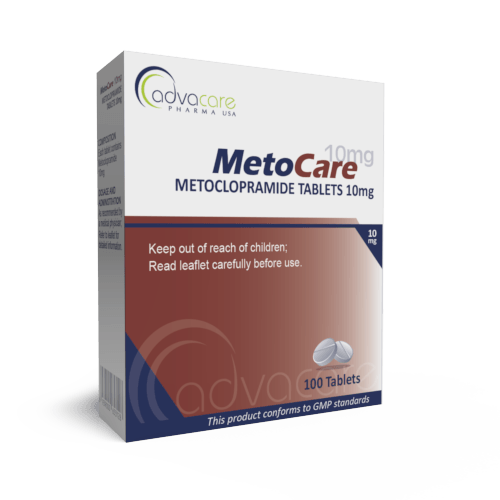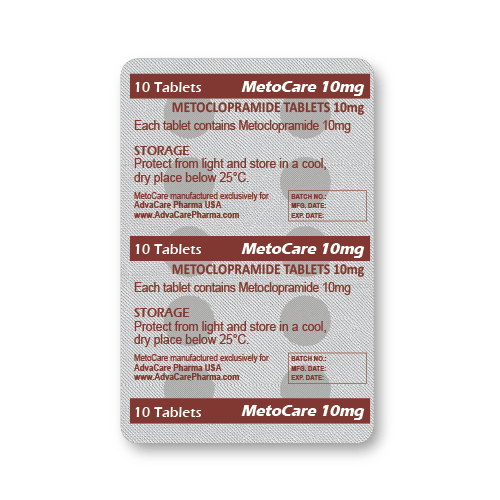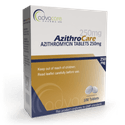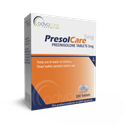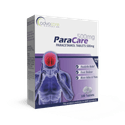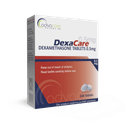- Home›
- Pharmaceuticals›
- Pharmaceutical Tablets›
- Metoclopramide Tablets
Metoclopramide Tablets
Dosage
Packaging
What is Metoclopramide?
Active Ingredients: Metoclopramide
Metoclopramide Tablets are used to treat the symptoms of acute and recurrent diabetic gastroparesis. It is also indicated for gastroesophageal reflux disease (GERD) in patients who have not responded to other therapies. Oral metoclopramide is prescribed to treat and prevent nausea or vomiting caused by migraines.
Metoclopramide exerts prokinetic effects by inhibiting synaptic D2 receptors, agonizing serotonin 5-HT4 receptors, and antagonizing the inhibition of muscarinic receptors. The resultant increase in acetylcholine release increases lower esophageal sphincter and gastric tone, which accelerates gastric emptying. The release of dopamine relaxes the gastrointestinal (GI) tract, allowing increased GI motility. The increase in gut motility helps relieve GI discomfort.
Metoclopramide also exerts antiemetic effects by inhibiting dopamine D2 and serotonin 5-HT3 receptors in the area postrema of the brain, which decreases the symptoms of nausea and vomiting.
This GMP-certified medication is produced and exported by AdvaCare Pharma. Metoclopramide Tablets, Injections, and Oral Solutions are manufactured in our facilities in China, India, and the USA. Our factories comply with WHO guidelines and standards, and we regularly inspect these facilities to ensure they meet these high standards.
Why are we a top Metoclopramide manufacturer?
We are a Metoclopramide manufacturer engaged in the global distribution of 200+ oral solid pharmaceutical products in tablet dosage form.
As an American-owned and operated company, we are devoted to the manufacture and supply of superior quality, yet cost-effective pharmaceuticals to improve access to healthcare solutions worldwide. AdvaCare Pharma manufactures Metoclopramide Tablets, and over 500 other pharmaceutical treatments, according to strict GMP regulations as part of our global commitment to bring efficacious medicines to pharmaceutical distributors, hospitals, pharmacies and other medical institutions.
Uses
What is Metoclopramide used for?
It is used to treat heartburn associated with GERD and delayed gastric emptying (gastroparesis) in diabetic patients.
How are Metoclopramide Tablets used?
This medication is intended to be taken orally. Metoclopramide Tablets should be taken 30 minutes before each meal and at bedtime.
What dose should be given and for how long?
Dosage may vary based on different medical indications:
- For the treatment of GERD symptoms in adults, the recommended dose is 10 to 15mg, taken 4 times a day for 4 to 12 weeks. The maximum recommended daily dose is 60mg.
- For the treatment of GERD symptoms in older patients (≥ 65 years), the recommended dose is 5mg, taken 4 times a day for 4 to 12 weeks. The maximum recommended daily dose is 60mg.
- For the treatment of acute and recurrent diabetic gastroparesis in adults, the recommended dose is 10mg, taken 4 times a day for 2 to 8 weeks. The maximum recommended daily dose is 40mg.
- For the treatment of acute and recurrent diabetic gastroparesis in older patients (≥ 65 years), the recommended dose is 5mg, taken 4 times a day for 4 to 12 weeks. The maximum recommended daily dose is 60mg.
- For the treatment of intermittent symptoms, the recommended dose is 20mg, taken once.
Metoclopramide Tablets should not be taken for longer than 12 weeks due to the increased risk of adverse events. Refer to a doctor or pharmacist for more specific guidelines on dosage. Do not exceed what they advise.
Who can use Metoclopramide?
Metoclopramide can be administered to adults, but caution is advised for specific groups of patients.
Pregnant Animal studies have not revealed evidence of adverse fetal developmental effects related to metoclopramide administration at doses exceeding 6 to 12 times the maximum recommended human dose (MRHD). Human data on metoclopramide use during pregnancy have not reported an increased risk of adverse pregnancy-related outcomes. Metoclopramide is known to cross the placental barrier and may result in extrapyramidal signs and methemoglobinemia in neonates that are exposed to metoclopramide during delivery. Metoclopramide is potentially safe to use during pregnancy. Strong caution is advised when administering metoclopramide during childbirth.
Nursing Metoclopramide is excreted in human milk. There are reports of nursing infants exposed to metoclopramide experiencing adverse gastrointestinal (GI) events, such as GI discomfort and increased gas. Nursing infants should be monitored for extrapyramidal side effects and methemoglobinemia. When administering metoclopramide to nursing patients, the potential maternal benefits, infant risk, and benefits in breastfeeding infants should all be considered.
Pediatric The safety and efficacy of metoclopramide have not been established in children. Metoclopramide is not recommended for pediatric patients due to the risk of adverse events, such as tardive dyskinesia, extrapyramidal symptoms, and methemoglobinemia (particularly in neonates).
Geriatric Due to age-related decreases in renal function and increases in drug sensitivity, decreased dosing in older patients is recommended.
Other warnings
Metoclopramide should not be used in cases where increasing GI motility may be dangerous, such as instances of GI bleeding, mechanical obstruction, or perforation.
Metoclopramide is not recommended for use in patients with a history of depression, as it may increase the risk of suicidal ideation and behaviors and precipitate or worsen depression.
In patients with moderate to severe renal insufficiency, metoclopramide dosages should be reduced to lower the risk of adverse events.
In patients with moderate to severe hepatic insufficiency, metoclopramide dosages should be reduced to lower the risk of adverse events. Dosage reductions in those with mild hepatic insufficiency is not necessary.
Metoclopramide use can cause tardive dyskinesia (TD), which is a condition describing involuntary movements of the face, tongue, trunk, and/or extremities, that is potentially irreversible. Increases in treatment duration and cumulative dosages increase the risk of TD and the likelihood that it will become irreversible. This risk is elevated in patients with diabetes mellitus and older patients, particularly older females. Due to the risk of TD, metoclopramide treatments lasting longer than 12 weeks should be avoided, and dosages in older patients should be reduced. Upon any signs of TD, metoclopramide should be discontinued immediately. There are no effective treatments for cases of TD. Some patients may remit partially or completely within weeks to months of treatment cessation.
Extrapyramidal symptoms (EPS), parkinsonian symptoms, and motor restlessness have been reported with metoclopramide use. These reactions can occur in the first 24 to 48 hours after initiating treatment or months after. They are more likely to occur in adults younger than 30 and at doses exceeding the recommendations. Other medications that can cause EPS, like antipsychotics, should be avoided. Those who experience signs of EPS and other related symptoms should discontinue treatment immediately and seek medical attention. Symptoms may resolve within several months following metoclopramide discontinuation.
Metoclopramide treatment may cause neuroleptic malignant syndrome (NMS), which can be fatal. NMS can manifest as a very high fever (hyperpyrexia), muscle rigidity, altered mental status, irregular heartbeat or blood pressure, rapid heartbeat, and excessive sweating. Symptoms that may be evident with serological testing include elevated creatine phosphokinase, myoglobinuria, and acute renal failure. The development of NMS is associated with metoclopramide overdosage and concomitant treatment with other medications that can cause NMS. Metoclopramide use is contraindicated in such patients and should be discontinued immediately upon signs of NMS.
Metoclopramide may reduce the mental and/or physical abilities required to perform tasks that require mental alertness, such as operating a vehicle or other machinery. These impairments may be exacerbated by concomitant use of central nervous system depressants (alcohol, sedatives) or drugs associated with a risk of EPS. Either metoclopramide or the concomitant medication(s) should be discontinued, based on their importance to the patient.
Metoclopramide use is contraindicated in patients with hypertension or who are taking monoamine oxidase inhibitors (MAOIs).
Due to transient increases in aldosterone levels, patients with hepatic impairment or heart failure are at an increased risk of experiencing fluid retention and volume overload while taking metoclopramide. Metoclopramide should be discontinued if these reactions occur.
Hyperprolactinemia has been reported in patients taking medications that elevate prolactin levels, like metoclopramide. Galactorrhea, amenorrhea, gynecomastia, and impotence, resulting from medication-related impairment of gonadal steroidogenesis, have all been reported.
In patients who are poor CYP2D6 metabolizers, metoclopramide elimination is slowed. To decrease the risk of metoclopramide-related toxicity, doses should be reduced in such patients.
Metoclopramide may decrease the absorption of medications from the stomach and increase the absorption of drugs from the small intestine.
Food delivery to the intestines will be accelerated, which may affect blood sugar control in diabetic patients that use exogenous insulin. Insulin dosage and timing may need to be adjusted to prevent hypoglycemia in such patients.
Side Effects
As with all pharmaceuticals, some unwanted effects can occur from the use of Metoclopramide Tablets.
Common side effects include, but may not be limited to:
- drowsiness
- headache
- itching
- sleeping problems
- breast swelling
- nausea
- vomiting
- thirst
Serious side effects may include:
- signs of an allergic reaction
- tardive dyskinesia (due to long-term usage)
- changes in mood or behavior (suicidal thoughts, worsening or new depression)
- seizures
- rapid weight gain or unusual swelling
- high fever, excessive sweating, irregular heartbeat
- high blood pressure (hypertension)
For a comprehensive understanding of all potential side effects, consult a medical professional.
If any symptoms persist or worsen, or you notice any other symptoms, please call your doctor.
Precautions
Do NOT use Metoclopramide Tablets if:
- You are allergic to metoclopramide or any other ingredient.
- You have gastrointestinal bleeding or other GI problems.
- You have pheochromocytoma.
- You have a history of seizures.
- You are using medications that increase extrapyramidal reactions.
- You have a history of tardive dyskinesia or are taking medications that may cause it.
- You have Parkinson’s disease or are taking antiparkinsonian agents.
Before treatment, consult your doctor regarding any medications you are taking to address potential drug interactions.
This medication may not be suitable for people with certain conditions, so it is important to consult with a doctor if you have any health conditions.
References
Effect of Metoclopramide in Diabetic Gastroparesis
This study aimed to assess the impact of metoclopramide, both through parenteral and oral administration, on delayed gastric emptying in symptomatic patients with diabetic gastroparesis, excluding mechanical issues like ulceration. It also evaluates the efficacy of metoclopramide in alleviating symptoms of diabetic gastroparesis in a double-blind crossover trial.
Thirteen patients exhibiting subjective signs of gastric stasis, confirmed by delayed gastric emptying of an isotope-labeled semisolid meal, experienced significant acceleration (p < 0.05) following the intravenous administration of 10mg of metoclopramide. These patients underwent a randomized double-blind crossover trial, receiving either metoclopramide 10mg or a placebo before meals and at bedtime for 3 weeks. During the metoclopramide therapy, symptoms such as nausea, vomiting, anorexia, fullness, and bloating were significantly reduced (p < 0.05) compared to placebo, with an overall mean symptom reduction of 52.6%. Gastric emptying studies in seven patients post-trial revealed reduced gastric retention.
The conclusion is that metoclopramide is efficient in managing diabetic gastroparesis, offering antiemetic properties alongside its effects on gastric emptying.

You might be interested in...
Why AdvaCare Pharma?
As an industry leader, we are aware of our responsibility to provide affordable and sustainable solutions to improve healthcare worldwide.
